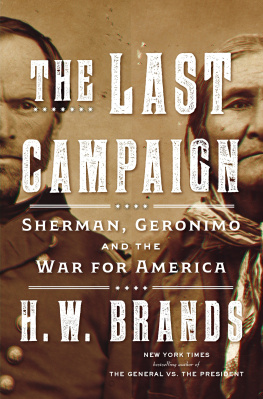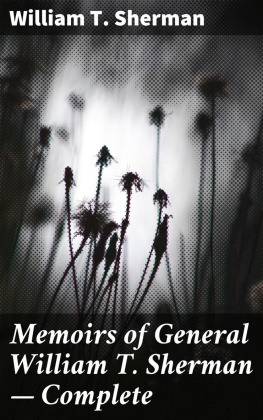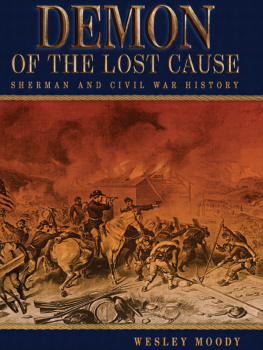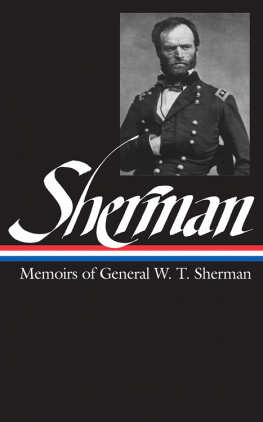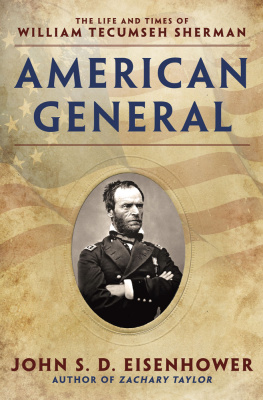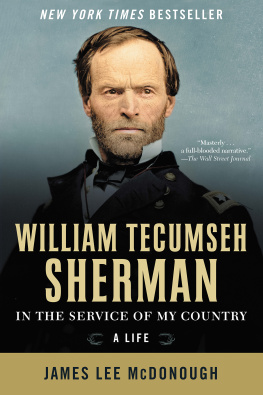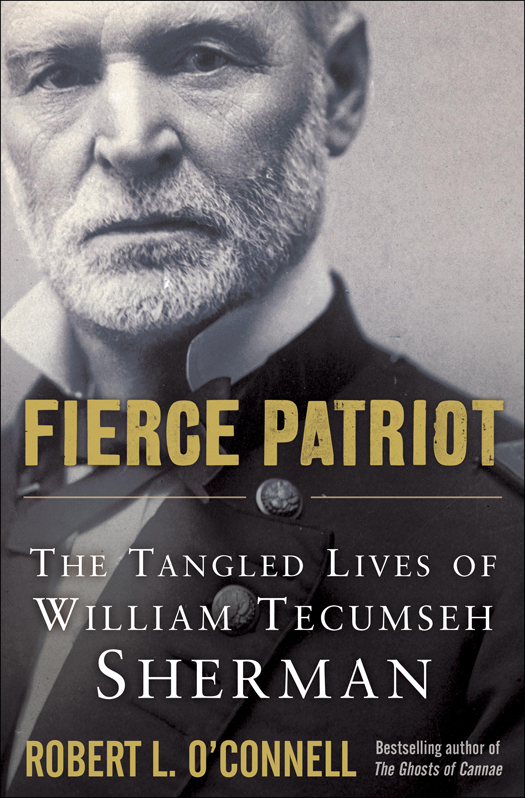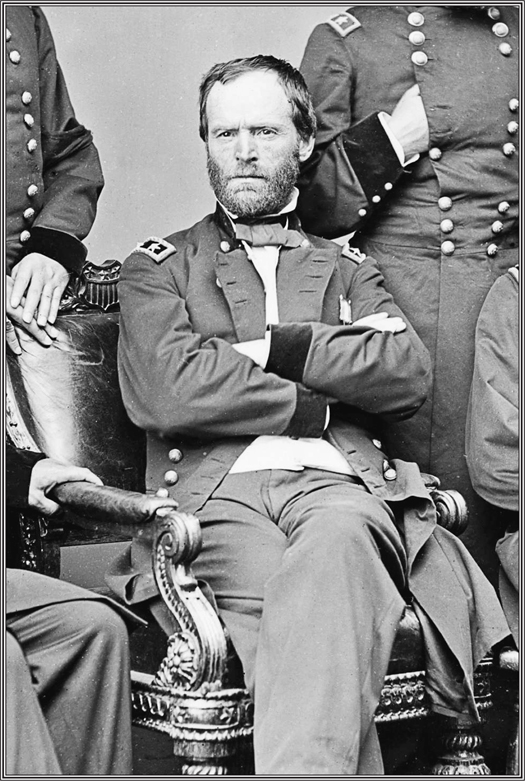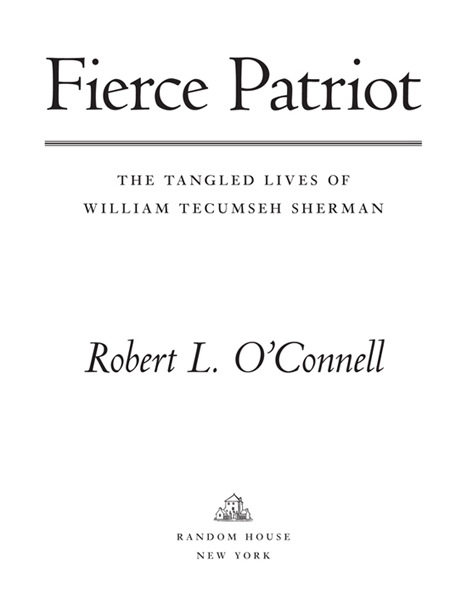Copyright 2014 by Robert L. OConnell
Maps copyright 2014 by Hal Jespersen
All rights reserved.
Published in the United States by Random House, an imprint and division of Random House LLC, a Penguin Random House Company, New York.
R ANDOM H OUSE and the H OUSE colophon are registered trademarks of Random House LLC.
Library of Congress Cataloging-in-Publication Data
OConnell, Robert L.
Fierce patriot: the tangled lives of William Tecumseh Sherman / Robert L. OConnell.
pages cm
ISBN 978-1-4000-6972-9
eBook ISBN 978-0-679-60469-3
1. Sherman, William T. (William Tecumseh), 18201891. 2. United StatesHistoryCivil War, 18611865Biography. 3. GeneralsUnited StatesBiography. 4. United States. ArmyBiography. I. Title.
E467.1.S55O25 2014 973.7092dc23 2013028999
[B]
www.atrandom.com
Jacket design: David G. Stevenson
Front-jacket photograph: Kansas State Historical Society
v3.1
Introduction
NAME RECOGNITION would not be the problem. William Tecumseh Shermanabout as memorable a moniker as exists in American military history. He and Grant won the Civil War. Named a tank after him. Broad segments of the American public, albeit mostly male, can probably conjure up at least this much.
But from here on, the general reputation of the general takes a dive, caricatured by a T-shirt sold at the 1996 Olympics featuring Shermans image emblazoned on a penumbra of flames along with the motto Atlantas Original Torchbearer. This is mostly just darkly funny now, since its broadly understood that the satanic Sherman was an invention of the postwar South, specifically those intent on turning the Confederacy into a Lost Causea noble endeavor rather than an unmitigated disaster. Sherman as intruder and dark destroyer made a perfect foil for the Souths marble man, Robert E. Lee, the great defender. But if the myth of the Lost Cause was ripped to shreds in the civil rights era, it still hasnt done Shermans reputation much good.
Thats because he still stands indicted as one of the originators of what is termed modern warwholesale assaults on civilian populations as an integral part of military strategy. Thinking along these lines, we can easily draw a direct path from Shermans March through Georgia and the Carolinas to the superlethal industrial wars of the twentieth century, then on to holding entire populations hostage to nearly instant nuclear destruction. Not exactly a sunny consequence to drape over a legacy. Yet it too is about as flimsy and transparent as the Lost Cause. Sherman was not clairvoyant; he had only the foggiest notion of where military technology was heading. He was enveloped in his own time, intent upon accomplishing specific strategic objectives. He did what worked, and the idea of his being at the root of the future of war would have struck him as laughable. But there he remains, perhaps conceded a measure of absolution on these grounds, but still a resident of historys darker side.
Actually, thats part of the attraction. Initially, at leastuntil it becomes apparent that this was hardly Shermans image among contemporaries. Still, any attempt to capture or even approximate the actual Sherman is fraught with pitfalls. For one thing, the very nature of his personality makes it easy to lapse into caricature.
There is an undeniably daffy aspect to Sherman. Calling him a motormouth understates the case: he was a veritable volcano of verbiage, as borne out by a mountain of letters, memoranda, and other official papers, not to mention the uniformly gabby impression he left among contemporaries. If there were a contest for who spoke the most words in a lifetime, Sherman would have been a finalisthe lived a long time and slept very little; otherwise he was talking. He said exactly what was on his mind at that instant, until his quicksilver brain turned to an entirely different matter, then to a third, and perhaps to a fourth, then back to the firstunceasingspewing orders, analysis, advice, and anecdotes in a random pattern that often left listeners stunned and amazed. One prominent Civil War historian, Gary Gallagher, described Sherman as lacking cognitive filters. It all came out. And this is a real problem in trying to resurrect the mans nature.
One approach that seems to help is to draw a distinction between the Sherman of vast opinion and the walk-around, quotidian Sherman. The former said and wrote a great deal that could be used against him; the latter was an almost compulsively gregarious individual who normally treated other people, even adversaries, courteously and reasonably. He could even be a good listener. He almost never lost his temper. The worse the situation, the more clearheaded Sherman became. To contemporaries he was a jumble of sagacity, rectitude, shoot-from-the-hip sincerity, prepotency, and grumpinessall rolled into a unique being known and beloved by Americans simply as Uncle Billythe nickname originally bestowed upon him by his men during the Civil War. Other military heroes were similarly reveredJackson, Grant, Eisenhowerbut partially as politicians. Uncle Billy was always just a soldier, our only true celebrity general.
But he was also one with a sardonic, at times even self-mocking, sense of humor. Consider Sherman answering the door in the middle of the night for an important dispatch with a cheery, I have seen the devil. Have you? Or imagine him in the middle of a battle coming upon a soldier cowering behind a tree and loudly proclaiming his intention to desertprompting Sherman to shower the tree with rocks, convincing the reluctant warrior he was under even heavier fire. Crazy Billythat too was part of the image.
We have no analogue today. If you wanted to point to an individual in recent memory who most resembles Sherman, one choice might be Katharine Hepburna supermasculine version, but with the same prickly combination of irrepressible self-righteousness, good sense, and charisma.
If nothing else, this comparison calls attention to an aspect not much noted: Sherman was, to an extraordinary degree, theatrical. This quality is useful militarily, especially when convincing others to risk their lives. But Sherman took it well beyond that. The theater was his favorite form of recreation, and players (often female players) would one day occupy a large portion of his social life.
More to the point, Sherman was instinctively theatrical in much that he did. His famously disheveled Civil War uniformstailored by Brooks Brothers, incidentallywere absolutely on the mark for the democratic volunteers manning the Army of the West. Later in his career, there is little of that. Photographs capture a sartorially appropriate, even dapper, Sherman acting out his role as commanding general of the United States Army. His life was undeniably dramatic, but you also have the feeling he framed it as such, the central character in his personal production. All the controversies, his endless battles with the press, his famous feudsit seems apparent he would have had it no other way.
Yet we will never actually see him in character. For we are separated by an electronic divide that precludes hearing the voice and cadence of this most talkative of men. Similarly, the few images we have freeze a figure who was almost never at rest and reduce his famously spiky red hair and grizzled beard to a kind of black-and-white mediocrity. So Uncle Billy must remain largely a creature of our imagination. We are left to deal with what has been preservedhis words; the Sherman of vast opinion.


